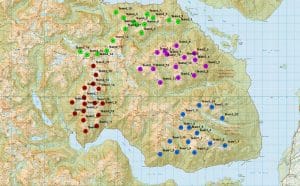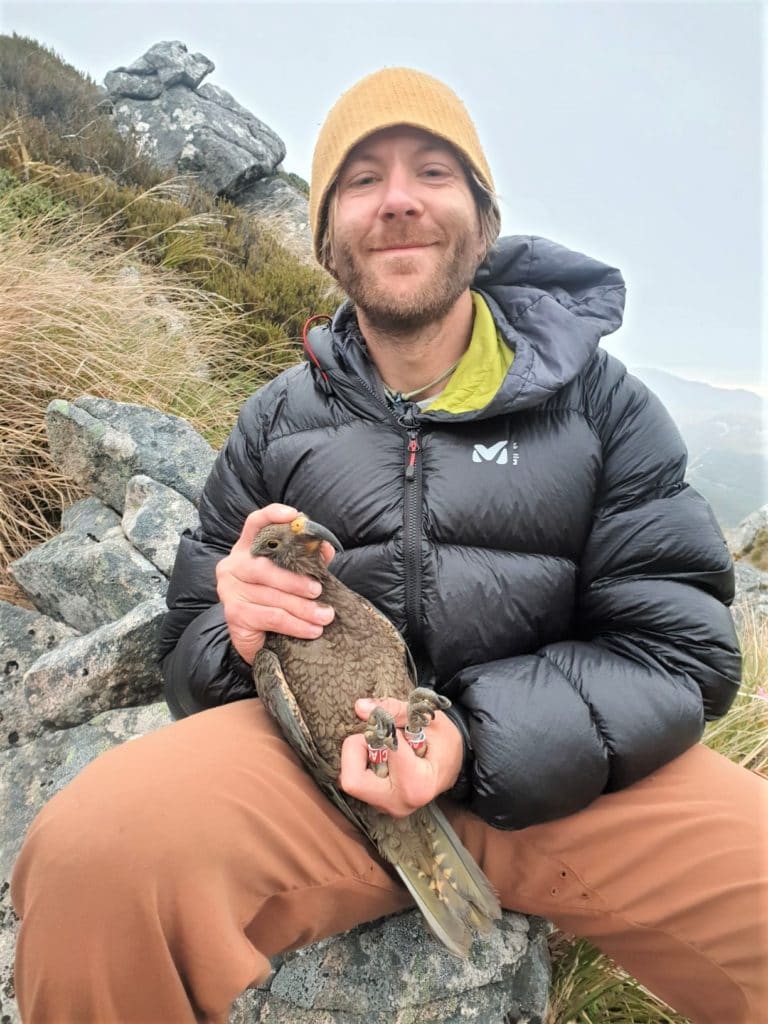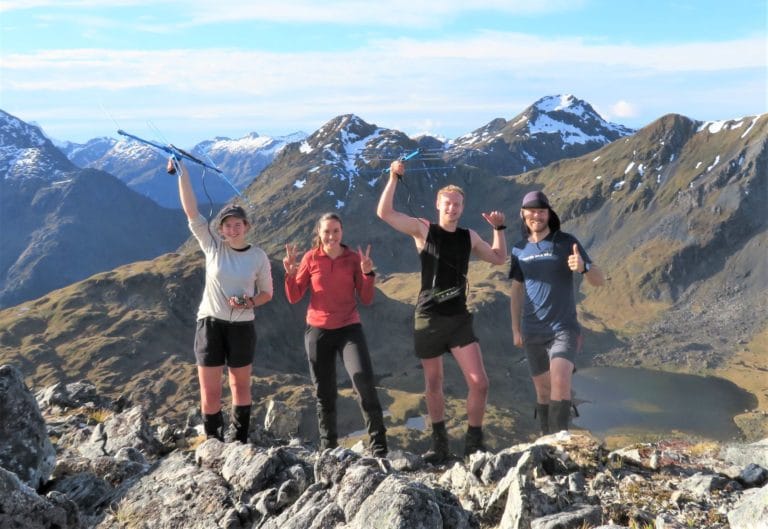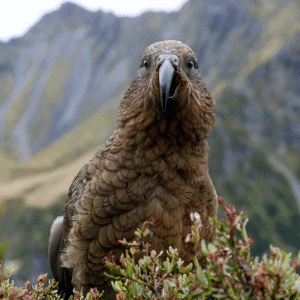Funded by the Nelson Family (in loving memory of Mike and Jean Nelson), Nga Whenua Rahui, Wellington Zoo Conservation Fund, Denver Zoo, Association of Zoos and Aquariums (AZA), Avian Scientific Advisory Group (ASAG), Name a kea sponsors, the Milford Rd Coffee Cat and DOC Iron Ranger donations, NZSki and Ultimate Hikes.
Supported by DOC Fiordland.
This site is unique in the South Island and has been chosen for the following reasons;
i) there is an extensive trapping programme in the Murchison Mtns as part of long-term management and protection of takahe. This is in contrast to the neighbouring Stuart Mtns study site which has minimal pest control to support whio in a very few of the valleys. This site therefore provides a unique opportunity to understand how important trapping is to kea productivity (although the Stuart Mtns had one of the highest numbers of kea caught during the January survey (over 40 birds), only two of these were fledglings raising questions of predator impact on nesting success in this area).

ii) DOC Fiordland has expressed a keen interest in supporting work at this site through the provision of staff for ongoing tracking of any radio-tagged adult females during subsequent breeding seasons and provision of field staff during annual surveys. DOC field personnel are very experienced at getting around the Murchisons which will be a major positive for kea work. DOC will also be able to follow up on radio-tagged females via skyranger flights normally only targeting takahe.
iii) This site will provide an additional training opportunity for local DOC personnel which will enable ongoing future monitoring of kea locally.
iv) Resightings of banded kea will be valuable for both sites and provide an idea of kea movement between sites.
Year 4 (November 2021) Summer Survey Catch Trip Results
Funded by NZSki and Ultimate Hikes
In November 2021, 32 kea were caught (2 recaptures and 30 banded). New egg-timer transmitters were applied to 6 adult females. Signals were obtained for two kea that had transmitters deployed in Feb 2021 however neither was nesting. All transmitters deployed prior to 2021 have now expired so there are currently 8 active to follow up during the 2022 breeding season.
Since the project began in 2019, four catch trips and four nest searching trips have been carried out. A total of 151 birds have been banded and 16 egg-timer transmitters deployed, however only one nest has been found.
Year 3 (2021) Summer Survey Catch Trip Results
Funded by the Avian Scientific Advisory Group (ASAG).
Thirteen kea were caught in the Murchison Mountains between the 5th – 14th February including two adult females who were fitted with transmitters. This now brings the total number of adult kea fitted with transmitters to eleven (all female) with ten still active. Telemetry checks of existing radio-tagged females to check on their location and status were carried out – Rima, Telly, Bernice and Tuataras signals were not picked up and Vixens transmitter (on mortality) was not able to be recovered.
Surveys were carried out each day (6-9 am/pm), whenever the weather allowed.
Year 2 - Summer Survey Catch Trip Results
Funded by the Association of Zoos and Aquariums (AZA), Wellington Zoo Conservation Fund, Avian Scientific Advisory Group (ASAG), Kea Sponsors and the Milford Coffee Cat.
From the 23rd to the 26th February 2020, three teams with kea capture and handling experience, along with a mix of volunteers and MCU staff, surveyed kea at 8 sites across 3,500ha in the Murchison Mountains. A total of 43 individual surveys were carried out between the hours of 6 am to 9 am and 6 pm to 9 pm.
All kea that were heard and seen were recorded with times and directions noted to indicate where they might be located. Notes were taken on kea activity outside of survey hours and any sign of significant activity followed up on. One transmitter was recovered and was shown to have been chewed off immediately after it was attached the previous year.
There were numerous kea seen at most sites and flocks of up to 7 kea seen at some locations. 24 Kea were caught during the trip. Bands were attached to all newly captured birds, however as there were no new adult females captured, no new transmitters were deployed.

11 of the captured kea were tested for lead and all returned low blood lead levels.
There were lots of kea seen, many of which were fledglings. This indicates that there was a successful breeding season in the area and that the survey was timed correctly to encounter young birds after they had fledged the nest.
Being the second year that we have had teams in the Murchison Mountains, we were able to identify many birds that had previously been caught and banded. One of these was recaptured and had new bands attached. Tough Daddy was originally caught in the Jennings Burn in 2010 approximately 12km away from the site where he was caught on this trip.
Follow up monitoring
Follow-up fixed-wing (Skyranger) flights to detect the nine adult females fitted with transmitters for nesting activity and survivorship were carried out on 8 August, 11 September and 1 December with a ground tracking team following up on foot 26-29th October. No breeding activity was picked up throughout the season.
- 8 August: Nine signals picked up (Telly, Maddalena, Vixen, Tuatara, Rimu, Francesca, Bernice, Bernadette and Olivine).
- 11 September: Seven signals picked up (Telly, Maddalena, Tuatara, Rimu, Francesca, Bernice and Olivine).
- 26 -29 October: Nine signals confirmed. The one known nest cavity was visited (unknown female) but was not active. Two new juvenile males (Heremia and Schrodinger) were captured, banded and blood work carried out (for genetics, health and isotope testing).
- 1 December: Seven signals picked up (Telly, Maddalena, Vixen, Rimu, Francesca, Bernice and Olivine).

Year 1 - Summer Survey-Catch Trip Results
Funded by the Nelson Family, Nga Whenua Rahui, Wellington Zoo, Denver Zoo and Milford Rd Coffee Cat and Iron Ranger donations.
From the 24th to the 31st January 2019, four teams with kea capture and handling experience, along with a mix of volunteers and Department of Conservation staff, surveyed 25 sites in the Murchison Mountains area, for kea.
Numerous kea were seen at most sites and flocks of up to 12 kea seen at some locations. A total of 88 Kea were caught during the trip (the largest number ever in one trip), transmitters attached to 10 adult females and bands were attached to all captured birds.

Additionally, one previously active nest was checked and the remains of 3 chicks at varying ages of development were found outside the cavity. Trail cameras that were deployed failed to capture the predation events but it is likely that a stoat visited this nest on 3 separate occasions and killed the chicks.
24 kea were also tested for lead poisoning. 2 males (a second year and an adult), returned levels above the accepted 20ug/dL.
Follow up monitoring
Follow-up fixed-wing (Skyranger) flights to detect adult female nesting activity and survivorship were carried out on the 11th February and the 4th May 2019. 9 of the 10 females currently with transmitters attached, were located and found to be active in February. One female's transmitter was found to be on mortality mode (date indicating it had most probably been chewed off and dropped soon after attachment. This will be recovered during the next field trip). All 9 remaining females were found to be active during May.